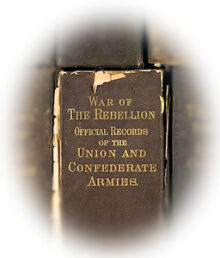WASHINGTON, April 8, 1861.
General G. T. BEAUREGARD:
Accounts are uncertain, because of the constant vacillation of this Government. We were reassured yesterday that the status of Sumter would not be changed without previous notice to Governor Pickens, but we have no faith in them. The war policy prevails in the Cabinet at this hour.
M. J. CRAWFORD.
—–
CHARLESTON, April 8, 1861.
L. P. WALKER:
Authorized messenger from Lincoln just informed Governor Pickens and myself that provisions would be sent to Sumter peaceably, otherwise by force.
G. T. BEAUREGARD.
—–
MONTGOMERY, April 8, 1861.
General BEAUREGARD, Charleston:
Under no circumstances are you to allow provisions to be sent to Fort Sumter.
L. P. WALKER.
—–
CHARLESTON, April 8, 1861.
Hon. L. P. WALKER:
Anderson’s provisions stopped yesterday. No answer from him. Am calling out balance of contingent troops.
G. T. BEAUREGARD.
—–
HEADQUARTERS, STATE OF SOUTH CAROLINA,
April 8, 1861.
[General BEAUREGARD :]
DEAR GENERAL: I inclose the within copy of Major Anderson’s note. Please say to the Secretary of War that we thought detaching an officer from the garrison was weakening its efficiency and not taking much from the consumption of food. Tell him that you as well as myself saw the foolish firing, and both regretted it, and that you immediately issued orders as to the future firing, &c., and that the captain in charge of the watch-vessel) the Petrel, was discharged for his neglect of duty, &c.
In great haste, but most sincerely,
F. W. PICKENS.
—–
HDQRS. PROVISIONAL ARMY CONFEDERATE STATES,
Charleston, S.C., April 8, 1861.
General L. P. WALKER, Secretary of War, Montgomery, Ala.:
SIR: The War Department letter of the 6th instant has been received. I send herewith a copy of the letter addressed yesterday to Major Robert Anderson, stopping his provisions from this city, in obedience to the instructions of the Department. He has not yet answered it, probably on account of the prevailing bad weather, or perhaps he wishes to await the orders of the United States Government.
Lieutenant Talbot was allowed to go to Washington in order to diminish as much as practicable the number of Major Anderson’s officers, and in the hope that he would communicate to the Government at Washington their true condition in Fort Sumter, which Governor Pickens and myself have reasons to believe is not satisfactory to them.
On account of the unfortunate publication this morning of the proceedings of the State Convention of South Carolina, containing a detailed report of the State secretary of war, giving the exact condition, strength, and number of batteries and troops collected for the defense of this harbor, I have called out the balance of the five thousand men to which I have been limited by my instructions of the 1st ultimo–a measure rendered still more necessary on account of the warlike preparations at present being made by the United States Government with so much mystery.
I remain, sir, very respectfully, your obedient servant,
G. T. BEAUREGARD,
Brigadier-General, Commanding.
—–
WAR DEPARTMENT, C. S. A.,
Montgomery, April 8, 1861.
His Excellency F. W. PICKENS, Charleston S.C.:
SIR: The discontinuance by the United States of negotiations with the Commissioners representing this Government, of which doubtless you have before this been made aware, leaves no doubt as to the policy we should pursue.
A large force will probably, and if at all, almost immediately, be needed to resist the coercive measures of the Washington administration. To meet this condition of affairs, this Department, acting with reference to the power vested in the Executive by the act of the Congress entitled “An act to provide for the public defense,” suggests to your excellency the necessity of calling at once for three thousand volunteers, to be drilled, equipped, and held in instant readiness to meet any requisition from this Department. These troops will, of course, not be receiving pay until they shall be mustered into service, but the emergency is so pressing that your excellency will fully appreciate the great importance of thorough preparation, especially in regard to instant capacity to move. A similar request has been addressed to the Executive of each of the Confederate States. Asking an early reply to the suggestions above made,
I am, very respectfully, your obedient servant,
P. WALKER.
(Similar letters to the governor of Florida, Tallahassee; the governor of Georgia; governor of Louisiana, Baton Rouge; governor of Texas, Austin; governor of Alabama, Montgomery; governor of Mississippi.)
—–
APRIL 8,1861.
“I am directed by the President of the United States to notify you to expect an attempt will be made to supply Fort Sumter with provisions only, and that if such attempt be not resisted no effort to throw in men, arms, or ammunition will be made without further notice, or in case of an attack upon the fort.”
—–
The above was communicated to us on the evening of April 8 by Robert S. Chew, esq., of the State Department in Washington, and Captain Talbot stated that it was from the President of the United States, as did Mr. Chew, and was delivered to him on the 6th instant at Washington, and this was read in their presence and admitted.
F. W. PICKENS.
G. T. BEAUREGARD.
